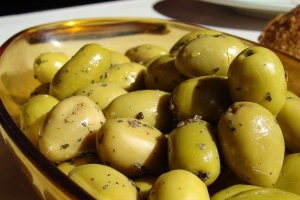- Olives eliminate excess cholesterol in the blood.
- Olives control blood pressure.
- Olives are a source of dietary fibre as an alternative to fruits and vegetables.
- Olives are a great source of Vitamin E
- Olives act as an antioxidant, protecting cells
- Olives reduce the effects of degenerative diseases like Alzheimer's, benign and malignant tumours, including less serious varicose veins and cavities
- Olives help prevent blood clots that could lead to a myocardial infarction or deep vein thrombosis (DVT)
- Olives protect cell membranes against diseases like cancer
- Olives are a great protection against anaemia
- Olives enhances fertility and reproductive system
- Olives play an important role in maintaining a healthy immune system, especially during oxidative stress and chronic viral diseases
- Olives are a great aphrodisiac.
- Olives are nutritious and rich in mineral content as sodium, potassium, magnesium, iron, phosphorus and iodine
- Olives provide essential vitamins and amino acids.
- Olives contain oleic acid, which has beneficial properties to protect the heart.
- Olives contain polyphenols, a natural chemical that reduce oxidative stress in the brain. So by eating a daily serving of olives helps improve your memory by up to 25%.
- Just one cup of olives is a great source of iron – 4.4mg.
- Eating olives can improve the appearance of wrinkles by 20% since they contain oleic acid, which keeps skin soft and healthy.
- By eating just 10 olives before a meal, you can reduce your appetite by up to 20%. This is because the monounsaturated fatty acids contained in olives slow down the digestion process and stimulate the hormone cholecystokinin, a hormone that sends messages of fullness to the brain.
- Not only does it do that, but it also helps your body to stimulate the production of adiponectin, a chemical that burns fat for up to five hours after ingestion.
Source: http://www.health24.com/Diet-and-nutrition/Healthy-foods/


